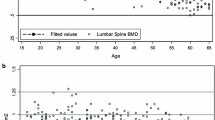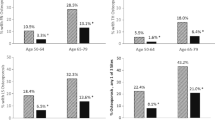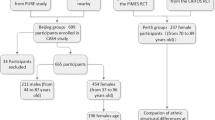Abstract
It is a common perception that Asians have lower bone density than Caucasians. However, such relationships could be confounded by bone size. In this study, the skeletal status of a convenience sample of 482 men and 887 women living in Hong Kong is compared with published data for Caucasians living in Rochester, Minnesota. Areal bone mineral density (BMD, g/cm2) and volumetric bone mineral apparent density (BMAD, g/cm3) were determined for the lumbar spine and proximal femur, using the Hologic QDR 2000 instrument. Cross-calibration was performed by measuring a common phantom, and the Hong Kong data were adjusted by a multiplication factor. Lumbar spine and femoral neck BMD and BMAD of Chinese men and women were all significantly lower (P<0.001 by t-test) than those of Caucasians, but the differences in BMAD were on average only about half the size of the differences in BMD. For instance, in postmenopausal Chinese women, BMD at the femoral neck and lumbar spine were 15.2% and 18.8% lower respectively, but BMAD at the femoral neck and lumbar spine were only 7.8% and 12.4% lower respectively. Similar trends were observed in men. After adjusting for age, body height and weight, the difference in BMAD between Caucasians and Chinese was further reduced and only statistically significant among postmenopausal women and among men younger than age 50 years for the lumbar spine. For instance, the adjusted BMAD in postmenopausal Chinese women at the femoral neck and lumbar spine were 3.9% (P=0.03 by ANCOVA) and 7.3% (P<0.001 by ANCOVA) lower respectively, while the adjusted BMAD at the lumbar spine for Chinese men younger than 50 years was 11.7% lower (P<0.01 by ANCOVA). Predictors of BMAD in Hong Kong Chinese women include body weight, age at menarche, cigarette smoking, and oral contraceptive use (P<0.001), while body weight was the only independent predictor of BMAD in Hong Kong Chinese men (P<0.001). We conclude that bone density is lower in Hong Kong Chinese men and women than in Caucasians, although such differences were attenuated by adjustments for bone size, body weight and height.
Similar content being viewed by others
References
Lau EMC, Lee JK, Suriwongpaisal P et al (2001) The incidence of hip fracture in four Asian countries: the Asian Osteoporosis Study (AOS). Osteoporos Int 12:239–243
Cooper C, Campion G, Melton LJ III (1992) Hip fractures in the elderly: a worldwide projection. Osteoporos Int 2:285–289
Lau EM, Chan HH, Woo J et al (1996) Normal ranges for vertebral height ratios and prevalence of vertebral fracture in Hong Kong Chinese: a comparison with American Caucasians. J Bone Miner Res 11(9):1364–1368
Lau EMC, Chan YH, Chan M et al (2000) Vertebral deformity in Chinese men: prevalence, risk factors, bone mineral density and body composition measurements. Calc Tissue Int 66:47–52
Ross PD, Fujiwara S, Huang C, Davis JW, Epstein RS, Wasnich RD, Kodama K, Melton LJ III (1995) Vertebral fracture prevalence in women in Hiroshima compared to Caucasians or Japanese in the U.S. Int J Epidemiol 24:1171–1177
Ling X, Cummings SR, Mingwei Q, Xihe Z, Xioashu C, Nevitt M, Stone K (2000) Vertebral fractures in Beijing, China: the Beijing Osteoporosis Project. J Bone Miner Res 15:2019–2025
Riggs BL, Melton LJ III (1986) Medical Progress: involutional osteoporosis. N Engl J Med 314:1676–1686
Seeman E (1998) Editorial: growth in bone mass and size--are racial and gender differences in bone mineral density more apparent than real? J Clin Endocrinol Metab 83:1414–1419
Russell-Aulet M, Wang J, Thornton JC, Colt, EWD, Pierson RN Jr (1993) Bone mineral density and mass in a cross-sectional study of white and Asian women. J Bone Miner Res 8:575–582
Marcus R, Greendale G, Blunt BA, Bush TL, Sherman S, Sherwin R, Wahner H, Wells B (1994) Correlates of bone mineral density in the postmenopausal estrogen/progestin interventions trial. J Bone Miner Res 9:1467–1476
Cundy T, Cornish J, Evans MC, Gamble G, Stapleton J, Reid IR (1995) Sources of interracial variation in bone mineral density. J Bone Miner Res 10:368–373
Bhudhikanok GS, Wang MC, Eckert K, Matkin C, Marcus R, Bachrach LK (1996) Differences in bone mineral in young Asian and Caucasian Americans may reflect differences in bone size. J Bone Miner Res 11:1545–1556
Ross PD, He YF, Yates AJ et al (1996) Body size accounts for most differences in bone density between Asian and Caucasian women: the EPIC Study Group. Calcif Tissue Int 59:339–343
Marquez MA, Melton LJ III, Muhs JM et al (2001) Bone density in an immigrant population from Southeast Asia. Osteoporos Int 12:594–604
Nomura A, Wasnich RD, Heilbrun LK, Ross PD, Davis JW (1989) Comparison of bone mineral content between Japan-born and US-born Japanese subjects in Hawaii. Bone Miner 6:213–223
Kin K, Lee JH, Kushida K et al (1993) Bone density and body composition on the Pacific Rim: a comparison between Japan-born and U.S.-born Japanese American women. J Bone Miner Res 8:861–869
Woo J, Li M, Lau E (2001) Population bone mineral density measurement for Chinese women and men in Hong Kong. Osteoporos Int 12:289–295
Lau EMC, Woo J, Lam V, Hong A (2001) Milk supplementation of the diet of postmenopausal Chinese women on a low calcium intake retards bone loss. J Bone Miner Res 16:1704–1709
Lau EMC, Chan HHL, Woo J et al (1996) Body composition and bone mineral density in vertebral fracture patients and controls. Bone 6:657–662
Katzman DK, Bachrach LK, Carter DR, Marcus R (1991) Clinical and anthropometric correlates of bone mineral acquisition in healthy adolescent girls. J Clin Endocrinol Metab 73:1332–1339
Carter DR, Bouxsein ML, Marcus R (1992) New approaches for interpreting projected bone densitometry data. J Bone Miner Res 7:137–145
Prentice A, Parsons TJ, Cole TJ (1994) Uncritical use of bone mineral density in absorptiometry may lead to size-related artifacts in the identification of bone mineral determinants. Am J Clin Nutr 60:837–842
Black DM, Cummings SR, Stone K, Hudes E, Palermo L, Steiger P (1991) A new approach to defining normal vertebral dimensions. J Bone Miner Res 6:883–892
Cummings SR, Cauley JA, Palermo L et al (1994) Racial differences in hip axis lengths might explain racial differences in rates of hip fracture. The Study of Osteoporotic Fractures Research Group. Osteoporos Int 4:226–229
Nakamura T, Turner CH, Yoshikawa T et al (1994) Do variations in hip geometry explain differences in hip fracture risk between Japanese and white Americans? J Bone Miner Res 9:1071–1076
Lipsitz LA, Nakajima I, Gagnon M et al (1994) Muscle strength and fall rates among residents of Japanese and American nursing homes: an International Cross-Cultural Study. J Am Geriatr Soc 42:953–959
Davis JW, Nevitt MC, Wasnich RD, Ross PD (1999) A cross-cultural comparison of neuromuscular performance, functional status, and falls between Japanese and white women. J Gerontol Ser A Biol Sci Med Sci 54:M288–M292
Youm T, Koval KJ, Kummer FJ, Zuckerman JD (1999) Do all hip fractures result from a fall? Am J Orthop 28:290–294
Lang T, Li J, Harris S et al (1999) Assessment of vertebral bone mineral density using volumetric quantitative CT. J Comput Assist Tomogr 23:130–137
Acknowledgements
Supported in part by grant AR27065 from the National Institute of Arthritis, Musculoskeletal and Skin Diseases, U.S. Public Health Service. We are grateful to Mr. Martin Li of Hong Kong for performing the BMD measurements.
Author information
Authors and Affiliations
Corresponding author
Rights and permissions
About this article
Cite this article
Lau, E.M.C., Lynn, H., Woo, J. et al. Areal and volumetric bone density in Hong Kong Chinese: a comparison with Caucasians living in the United States. Osteoporos Int 14, 583–588 (2003). https://doi.org/10.1007/s00198-003-1402-7
Received:
Accepted:
Published:
Issue Date:
DOI: https://doi.org/10.1007/s00198-003-1402-7




